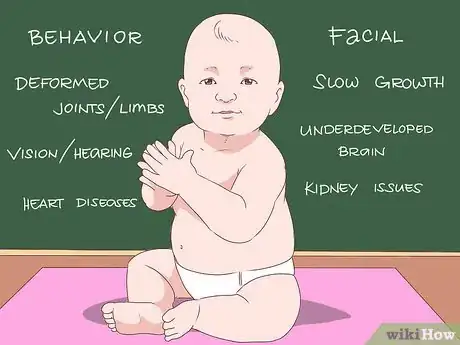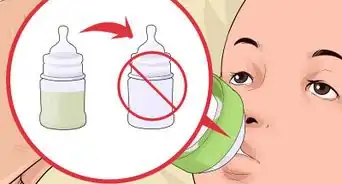This article was medically reviewed by Mandolin S. Ziadie, MD. Dr. Ziadie is a board certified Pathologist in South Florida. She specializes in renal, transplant, and pediatric Pathology and has over 12 years of experience. She earned her medical degree from the University of Miami School of Medicine in 2004 and completed her fellowship in Pediatric Pathology at Children’s Medical Center in 2010.
There are 10 references cited in this article, which can be found at the bottom of the page.
This article has been viewed 161,131 times.
Consuming alcohol during pregnancy can severely harm a developing fetus and may have lasting health and developmental consequences known as Fetal Alcohol Spectrum Disorders (FASDs).[1] One of the most distressing disorders caused by alcohol consumption during pregnancy is Fetal Alcohol Syndrome (FAS). It is a lifelong condition and yet one of the most preventable causes of birth defects and intellectual disability. If you notice any symptoms of FAS, see your child’s doctor as soon as possible to help formulate a treatment plan that may alleviate symptoms.
Steps
Recognizing the Symptoms of Fetal Alcohol Syndrome
-
1Be aware of your child’s risk for FAS. The exact cause of FAS is alcohol consumption. The more you drink while pregnant, especially during the first trimester, the greater the risk of your unborn fetus developing FAS. Being aware of your child’s risk for this disease can help you recognize it and get a diagnosis and treatment in a timely manner.
- Alcohol reaches the developing fetus through the placenta and causes higher blood alcohol concentration levels in a fetus than in you. A fetus metabolizes alcohol at a much slower rate.
- Alcohol interferes with oxygenation and nutrition delivery to your unborn baby. This can severely impact the fetus’s developing tissues and organs, including the brain.
- You may have consumed a lot of alcohol before you realized you were pregnant, putting your unborn baby at risk for FAS. Keep this in mind during and after your pregnancy.
-
2Recognize physical symptoms of FAS. There are many different physical symptoms of FAS that may be mild or severe. From distinctive facial features to slow growth patterns, identifying these common markers may help get your child a diagnosis and medical treatment.
- Symptoms can appear while the baby is still developing in utero or at birth. They may also only present later, such as behavior issues.
- Facial features such as wide-set eyes; an extremely thin upper lip; a short, upturned nose; and lack of lip folds between the nose and upper lip may indicate FAS. A child with FAS may also have narrow and small eyes.[2]
- Deformed joint and limbs may indicate FAS.
- Slow growth patterns both before and after birth may indicate FAS.
- Vision and hearing issues may indicate FAS.
- Small head circumference and underdeveloped brain may indicate FAS.
- Heart defects and issues with kidneys may also indicate FAS.
- Many symptoms of FAS resemble those of other diseases and conditions. If you suspect your child or another might have FAS, it’s important to see a doctor and/ or get a second medical opinion.
Advertisement -
3Observe brain and central nervous symptoms. FAS may also present itself as problems with a child’s brain and central nervous system. From poor memory and hyperactivity, observing these common neurological symptoms may help you identify FAS and get your child a diagnosis and medical treatment.
- Children with FAS may have poor coordination and balance.
- Children with FAS may have intellectual disabilities, learning disorders, poor memory, trouble with paying attention, or hyperactivity.
- Children with FAS may have trouble processing information, reasoning, and poor judgment skills.
- Children with FAS may also have rapidly changing moods or anxiety.
-
4Notice social and behavior issues. Fetal Alcohol Syndrome can also manifest itself in social and behavioral issues. From poor social skills to problems with impulse control, noticing these behavioral markers may help you identify FAS and get your child a diagnosis and medical treatment.
- Poor social skills including getting along with others may indicate FAS.
- A child with FAS may have difficulty in school or problems staying on task or working towards a goal.
- A child with FAS may have problems adapting to change or with impulse control.
- A child with FAS may have a poor concept of time.
Getting a Diagnosis and Treatment
-
1See your child’s pediatrician. If you suspect your child has Fetal Alcohol Syndrome, it is crucial to see your doctor and get a definitive diagnosis. Early detection and aggressive intervention may reduce the risk of long-term problems for a child with FAS.
- Make a list of symptoms you’ve noticed in your child so that your doctor can more easily make a diagnosis.[3]
- Let your doctor know if you consumed alcohol during your pregnancy. Be sure to include how much and how often you drank.[4]
- Your doctor may be able to assess your risk for FAS if you report the amount and timing of alcohol you consumed.[5]
- If you identify symptoms of FAS and do not see a doctor, inaction can have lasting consequences for your child.[6]
-
2Understand how your doctor diagnoses FAS. Your doctor needs a certain amount of expertise to make a definitive diagnosis of FAS in your child. Being open and honest can help your doctor successfully and quickly diagnose FAS in order to help your child as soon as possible.
- Your doctor will likely assess certain factors in making a diagnosis including: how often you drank during pregnancy, your child’s physical appearance, your child’s physical and neurological growth and development.[7]
- Your doctor may also consider: cognitive abilities and difficulties, health issues, and social and behavioral issues.[8]
-
3Examine the symptoms with your doctor. Your doctor will check for signs of FAS once you’ve described your child’s symptoms. She may be able to diagnose FAS with a simple physical examination in addition to more in-depth tests.[9]
- Your doctor will examine your child for physical symptoms including wide-set eyes; an extremely thin upper lip; a short, upturned nose; narrow and small eyes; deformed joints and limbs; vision and hearing issues; small head circumference; or heart defects such as a murmur.[10]
-
4Get tests and a diagnosis. If your doctor suspects that your has Fetal Alcohol Syndrome, she may order tests after conducting the physical exam. These tests can help confirm a diagnosis and help your doctor formulate a comprehensive treatment plan.
- Your doctor may order brain imaging studies such as an MRI or CT scan.
- Blood and urine tests may be ordered to help rule out other diseases that cause similar symptoms.
- If you are still pregnant, your doctor may order blood tests or a pregnancy ultrasound.[11]
-
5Get a CT scan or an MRI. Your doctor may want to confirm a diagnosis of FAS with more in depth tests. She may order that your child get an MRI or CT to assess physical and neurological issues.[12]
- CT scans and MRIs make images of your child’s brain and can make it easier for your doctor to identify damage to the brain. This can help her better formulate a treatment plan.[13]
- Your doctor may order a CT scan, which will require your child to lie still while a technician makes images of her brain. This form of X-ray imaging can help better see the brain and may show growth or developmental issues. [14]
- Your doctor may order an MRI, which will also require your child to lie inside of a large scanner for a few minutes. An MRI can make more in-depth pictures of how severe the damage to your child’s brain is.[15]
-
6Formulate a treatment plan. There is unfortunately no cure or specific treatment for FAS. Many symptoms of FAS generally last a lifetime.[16] However, early intervention can help reduce some of the effects of FAS. They may even help prevent some secondary disabilities.[17]
- Be aware that early diagnosis and intervention is critical.[18]
- Physical and mental deficiencies often last for a child’s lifetime.[19]
- Your doctor may prescribe or suggest medications to help with some symptoms such as hyperactivity. She may also recommend medical treatment for health problems including heart or kidney abnormalities.[20]
- Your doctor may suggest physical, occupational, and psychological therapy for help walking, talking, and social skills.[21]
- Your doctor may suggest placing your child with a special education teacher to help them better function in a school setting.[22]
- Your doctor may suggest counseling for the family.[23]
Warnings
- Any drink containing alcohol can do harm to a fetus.⧼thumbs_response⧽
- There is no safe amount of alcohol that a woman can drink while pregnant. There is also no safe time to drink during pregnancy. Alcohol can have adverse results on an unborn child in every trimester.⧼thumbs_response⧽
References
- ↑ https://www.nhs.uk/conditions/foetal-alcohol-spectrum-disorder/
- ↑ https://depts.washington.edu/fasdpn/htmls/fas-face.htm
- ↑ http://www.mayoclinic.org/diseases-conditions/fetal-alcohol-syndrome/basics/preparing-for-your-appointment/con-20021015
- ↑ https://www.nhs.uk/conditions/foetal-alcohol-spectrum-disorder/
- ↑ https://www.cdc.gov/ncbddd/fasd/facts.html
- ↑ http://www.nlm.nih.gov/medlineplus/ency/article/000911.htm
- ↑ https://www.cdc.gov/ncbddd/fasd/facts.html
- ↑ https://www.cdc.gov/ncbddd/fasd/facts.html
- ↑ https://www.cdc.gov/ncbddd/fasd/facts.html
- ↑ https://depts.washington.edu/fasdpn/htmls/fas-face.htm
- ↑ http://www.nlm.nih.gov/medlineplus/ency/article/000911.htm
- ↑ https://www.ncbi.nlm.nih.gov/pmc/articles/PMC3442778/
- ↑ https://www.ncbi.nlm.nih.gov/pmc/articles/PMC3442778/
- ↑ http://www.nlm.nih.gov/medlineplus/ency/article/000911.htm
- ↑ http://www.nlm.nih.gov/medlineplus/ency/article/000911.htm
- ↑ https://my.clevelandclinic.org/health/diseases/15677-fetal-alcohol-syndrome
- ↑ https://my.clevelandclinic.org/health/diseases/15677-fetal-alcohol-syndrome
- ↑ http://www.mayoclinic.org/diseases-conditions/fetal-alcohol-syndrome/basics/treatment/con-20021015
- ↑ https://www.ncbi.nlm.nih.gov/books/NBK448178/
- ↑ https://my.clevelandclinic.org/health/diseases/15677-fetal-alcohol-syndrome
- ↑ https://my.clevelandclinic.org/health/diseases/15677-fetal-alcohol-syndrome
- ↑ http://www.mayoclinic.org/diseases-conditions/fetal-alcohol-syndrome/basics/treatment/con-20021015
- ↑ http://www.mayoclinic.org/diseases-conditions/fetal-alcohol-syndrome/basics/treatment/con-20021015
About This Article
Fetal Alcohol Syndrome occurs when a mother’s consumption of alcohol damages her unborn baby. Common symptoms include facial defects like wide-set eyes, a thin upper lip, or a short, upturned nose. The baby may also have vision and hearing issues, problems with coordination and balance, and learning disabilities. As a result, they may be hyperactive and have poor social skills and impulse control. Other physical symptoms include a small head and underdeveloped brain, and heart and kidney issues. However, many of these symptoms can be associated with other causes and the only way to know for sure is with a medical diagnosis. If you think your baby may suffer from Fetal Alcohol Syndrome, see a pediatrician as soon as possible. An early diagnosis and treatment is important, since this can help reduce some of the effects. For more tips from our Medical co-author, including how doctors commonly treat Fetal Alcohol Syndrome, read on.







































































Medical Disclaimer
The content of this article is not intended to be a substitute for professional medical advice, examination, diagnosis, or treatment. You should always contact your doctor or other qualified healthcare professional before starting, changing, or stopping any kind of health treatment.
Read More...